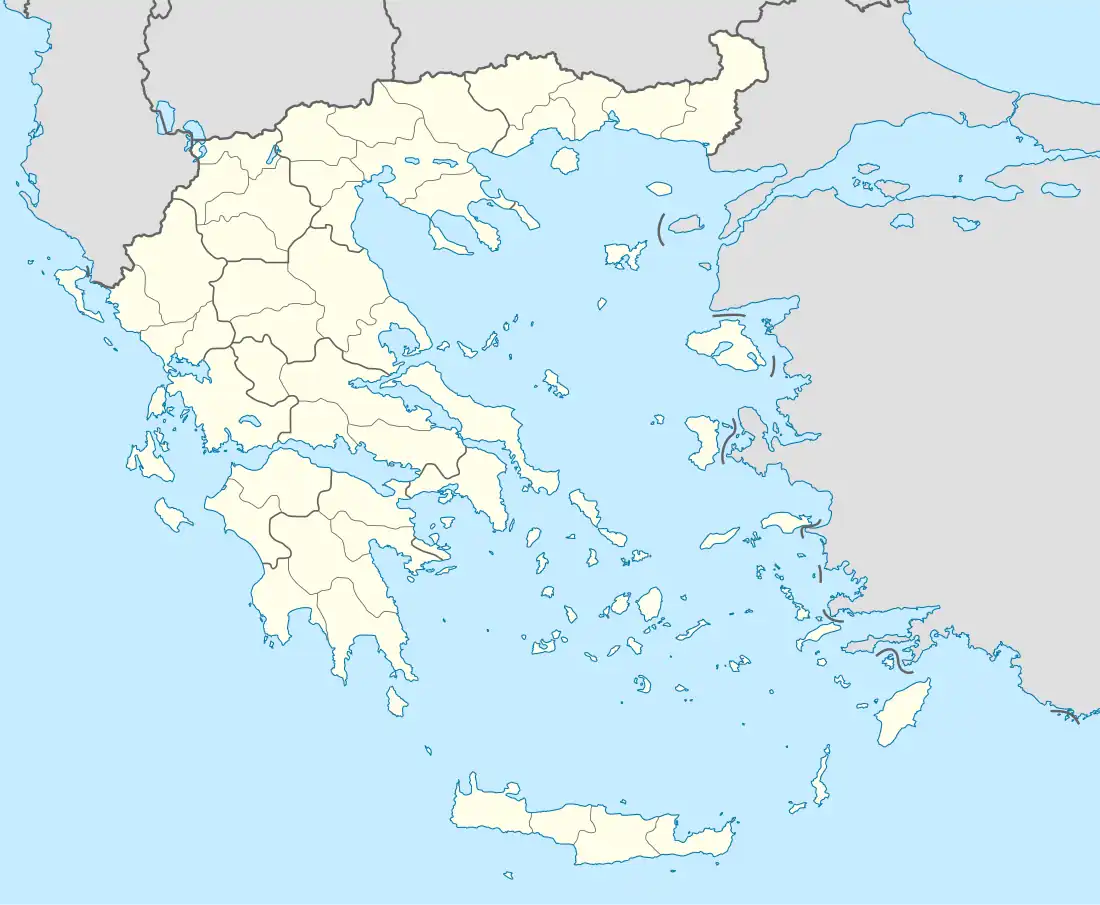Mavrochori | |
|---|---|
 Mavrochori (left), Polykarpi (right) | |
 Mavrochori | |
| Coordinates: 40°30′44″N 21°19′13″E / 40.51222°N 21.32028°E | |
| Country | Greece |
| Geographic region | Macedonia |
| Administrative region | Western Macedonia |
| Regional unit | Kastoria |
| Municipality | Kastoria |
| Municipal unit | Makednoi |
| Population (2011)[1] | |
| • Rural | 1,287 |
| Time zone | UTC+2 (EET) |
| • Summer (DST) | UTC+3 (EEST) |
Mavrochori (Greek: Μαυροχώρι(οv), meaning "black village"; before 1928: Μαύροβον - Mavrovon[2]) is a village on the shores of Lake Orestiada in Kastoria regional unit of Macedonia, Greece.[3]
Today Mavrochori is a tourist destination for a quiet vacation near the lake of Kastoria.[4] In addition to the trade fair, festive events take place on the 13th - 15 August of the Assumption of Mary, where the Monastery of Panagia Mavriotissa celebrates (it was built by General George Palaiologos in commemoration of the victory against the Normans in 1083).[5] The Mavrochori Nautical Club also operates in the village.[6]
History
It was in existence at least from 1380[5] and is denoted, under the name Mavrobo, in the British Baldwin & Craddock Map of Greece which was published on 1 January 1830.[7] The name Mavros, together with the name Krepeni, is found in a title deed executed by Serbian nobleman Nikola Bagaš.[8]
In the end of the 18th century the patriarch of the Mavrovitis family moved his people from the nearby Krepeni village to Mavrovo in order to avoid a plague pandemic, and it is believed that people were frequently moving between Krepeni and Mavrovo.[5]
The Monastery of Panagia Mavriotissa, originally named Mesonisiotissa (meaning "in the middle of the island"), was built near the village.[5]
Mavrochori had a historical relationship with both the Mavriotissa monastery as well as with the nearby village of Krepeni.[5]
During Ottoman rule, Mavrovo was populated by Christians and Muslims, it had one Greek school and one Muslim school and five inns.[9]
The Greek census (1920) recorded 1062 people in the village and in 1923 there were 450 inhabitants (or 45 families) who were Muslim.[10] Following the Greek-Turkish population exchange, in 1926 within Mavrovo there were refugee families from Asia Minor (55), Pontus (19) and one other from an unidentified location.[10] The Greek census (1928) recorded 1065 village inhabitants.[10] There were 72 refugee families (320 people) in 1928.[10] There were two mosques and two Muslim cemeteries in the village, later all destroyed.[11]
Notable people
- Konstantinos Papastavrou, Greek chieftain of the Macedonian Struggle[12]
- Filippos Petsalnikos, Greek politician, served as Speaker of the Hellenic Parliament[13]
References
- ↑ "Απογραφή Πληθυσμού - Κατοικιών 2011. ΜΟΝΙΜΟΣ Πληθυσμός" (in Greek). Hellenic Statistical Authority.
- ↑ "Name Changes of Settlements in Greece: Mavrovon – Mavrochori". Pandektis. Retrieved 30 March 2022.
- ↑ "Μαυροχώρι ΚΑΣΤΟΡΙΑΣ, Δήμος ΚΑΣΤΟΡΙΑΣ | buk.gr". buk.gr (in Greek). Retrieved 2022-01-28.
- ↑ "ΜΑΥΡΟΧΩΡΙ ΚΑΣΤΟΡΙΑ, ταξίδι στο μύθο!". www.holiday.gr. Retrieved 2022-01-28.
- 1 2 3 4 5 "Jason C. Mavrovitis, Out of the Balkans, Pt.1, Ch.2, p.29". www.pahh.com. Retrieved 2021-07-04.
- ↑ "ΝΑΥΤΙΚΟΣ ΟΜΙΛΟΣ ΜΑΥΡΟΧΩΡΙΟΥ - ΟΙ ΑΡΓΟΝΑΥΤΕΣ". Nautical Club of Mavrochori (in Greek). Retrieved 2022-01-28.
- ↑ "Map of the Balkan Peninsula". www.pahh.com. Retrieved 2022-01-28.
- ↑ Nicholas K. Moutsopoulos, Kastoria, the Virgin of Mavriotissa (Athens: Friends of Byzantine and Ancient Monuments of Kastoria, 1967), 85. Cited in http://www.pahh.com/mavrovitis/ch2/chapter2b.html
- ↑ Stavridopoulos 2015, p. 272.
- 1 2 3 4 Pelagidis, Efstathios (1992). Η αποκατάσταση των προσφύγων στη Δυτική Μακεδονία (1923-1930) [The rehabilitation of refugees in Western Macedonia: 1923–1930] (Ph.D.). Aristotle University of Thessaloniki. p. 76. Retrieved 30 March 2022.
- ↑ Stavridopoulos, Ioannis (2015). Μνημεία του άλλου: η διαχείριση της οθωμανικής πολιτιστική κληρονομιάς της Μακεδονίας από το 1912 έως σήμερα [Monuments of the other: The management of the Ottoman cultural heritage of Macedonia from 1912 until present] (Ph.D.). University of Ioannina. pp. 272–273. Retrieved 28 March 2022.
- ↑ Koliopoulos, Ioannis. "Αφανείς, γηγενείς Μακεδονομάχοι" (PDF). Society for Macedonian Studies (in Greek).
- ↑ "Βιογραφικό - Φίλιππος Πετσάλνικος". petsalnikos.gr. 2011-11-11. Archived from the original on 2011-11-12.